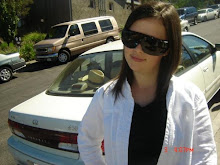 I had never heard of Watchmen
I had never heard of WatchmenAt any rate, it sounded interesting. I read a lot of mysteries and am drawn to procedurals on TV, and the theme of vigilantism pops up over and over again. I loved the idea of the public asking "Who watches the Watchmen?" Yes, they watch over us but who keeps them in check? Who prevents abuse of that power? I lean toward the left, and the idea of taking away someone's civil rights is despicable to me. I honestly believe that even though out current legal system has its problems, we need to operate within it. And yet... can it really be that black and white? Or are there shades of grey? That's why this theme is recurring in pop culture; you can examine the issue from different angles and come up with a different answer each time.
Having never read a graphic novel before, I had no idea what to expect. While I was excited to read it, I think I was also a little nervous. What was I getting myself into? As it turns out, I had nothing to worry about. I work as a proofreader and copy editor, and work has been extremely busy lately. Watchmen came along at the exact right moment -- not only was the story interesting, but because the medium was completely different, fresh and new, it held my attention better than a traditional novel would have.It was a relief.
Dude, I really liked it.
Okay, I liked some parts better than others. Rorschach was certainly the most compelling character to me, and the way he broke down his psychiatrist was one of the things that I kept thinking about long after that part of the story was over. I liked the way that the past was woven into the present via flashbacks and the supplemental back stories at the end of each chapter. When Laurie realized that The Comedian was her father, it kind of knocked my socks off. But what really got me was the very end, when Rorschach's journal was finally about to be discovered at the right-wing newspaper office. As Colin was saying, even the smartest man in the world couldn't pull off a flawless plan. But I didn't love The Black Freighter, and I thought the younger Nite Owl was a complete wet noodle. Also, Doc Manhattan on Mars? It didn't really speak to me. I was more interested in the interactions of the characters and what they learned from each other.
Watchmen definitely takes you on a journey, and it's funny to realize that it only takes place over a few days. The world that these characters live in is drawn, pun intended, so completely and convincingly that you kind of forget about everything else while you're there. I love how you get so many different perspectives on the events that take place, and they're all valid. You may not agree with Veidt or Rorschach, but you can't write them off. Not a lot of fiction is that fair to its characters, and it really worked. I think it showed a level of respect for the audience and I appreciated it.


No comments:
Post a Comment